The Happy Ending Blu-ray Movie
HomeThe Happy Ending Blu-ray Movie 
Limited Edition to 3000Twilight Time | 1969 | 112 min | Rated R | Jan 19, 2016
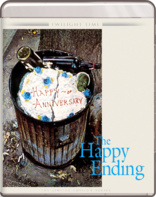
Movie rating
6.6 | / 10 |
Blu-ray rating
| Users | 0.0 | |
| Reviewer | 3.0 | |
| Overall | 3.0 |
Overview
The Happy Ending (1969)
A middle-aged woman walks out on her husband and family in a desperate attempt to find her true self.
Starring: John Forsythe, Jean Simmons, Shirley Jones, Teresa Wright, Lloyd BridgesDirector: Richard Brooks (I)
| Melodrama | Uncertain |
| Drama | Uncertain |
Specifications
Video
Video codec: MPEG-4 AVC
Video resolution: 1080p
Aspect ratio: 2.35:1
Original aspect ratio: 2.35:1
Audio
English: DTS-HD Master Audio Mono
Music: DTS-HD Master Audio 2.0
Subtitles
English
Discs
50GB Blu-ray Disc
Single disc (1 BD)
Playback
Region A (B, C untested)
Review
Rating summary
| Movie | 3.0 | |
| Video | 3.5 | |
| Audio | 4.0 | |
| Extras | 1.5 | |
| Overall | 3.0 |
The Happy Ending Blu-ray Movie Review
Reviewed by Jeffrey Kauffman January 22, 2016As a card carrying member of the Film Score Geek Society, I firmly believe the 1969 nominations for the Academy Award for Best Song were
the last time that at least four of the five nominees were undisputed classics, albeit in the pop vernacular that was popular during that era.
The Best Song category has always been something of a crap shoot, and it’s actually fun (at least for members of the Film Score Geek
Society) to pore over the category’s offerings through the years and see what was nominated and what eventually won. I’m sure there are
those who would argue that “It’s Hard Out There for a Pimp” is a masterpiece of inarguable craft and genius, but for curmudgeons of a
certain age, there’s no equal to the songwriting acumen that was so often on display from the Golden Age of Hollywood on through at least
the last year of the sixties. Some indication of the depth of the “bench” in this category comes courtesy of the realization that at various
points legends like George Gershwin, Oscar Hammerstein II and Irving Berlin had to manage with only a nomination to get them by in certain
years. While it’s certainly possible to find a dud in any given catalog of nominees, the sixties were an especially fertile decade for songs in
film, and the nominees and eventual winners are a virtual smörgåsbord of contemporary classics in the Great American Songbook, with
several Mancini-Mercer evergreens (“Moon River”, “Days of Wine and Roses”, “Charade”, “The Sweetheart Tree”) and Bacharach-David hits
(“Alfie”, “What’s New, Pussycat?”, “The Look of Love”) among the delights to be found.
It was actually pretty much a foregone conclusion
that Bacharach and David would be taking home the Oscar for 1969’s “Raindrops Keep Fallin’ on My Head”, a tune which had gone to Number
1 for B.J. Thomas, and indeed they were the
winners that year (with Bacharach also taking home a preordained statuette for Best Score for Butch Cassidy and the Sundance Kid). But the other
nominees that year were all worthy competitors, and several were major hits, including “Come Saturday Morning” from The Sterile Cuckoo, a wistful quasi-waltz by Fred
Karlin and Dory Previn that became one of The Sandpipers’ highest charting singles. An even bigger hit was Oliver’s rendition of Rod
McKuen’s “Jean” from The Prime of Miss Jean
Brodie, which rose to Number 2 on the pop charts and made it to the top spot on the Adult Contemporary (i.e., Easy Listening) list,
and which was interestingly also in 3/4. Not quite at that same level of popularity (and frankly the one song I wouldn’t include as a
“classic”) was Glen Campbell’s rendition of the theme from True
Grit, a song which barely cracked the Top 40 pop charts, but which did better for Campbell on the country and easy listening sides of
things. (To be fair, Don Black had his work cut out for him in trying to craft a lyric around a phrase like “true grit”.) And so, that’s four of the
five nominees that year. The fifth was the only song that didn’t achieve much popularity during the 1969-70 time frame, though future
Gong Show
mainstay Jaye P. Morgan managed to register at the very bottom of the easy listening chart at number 40 for one week with her rendition of
the lovely ballad "What Are You Doing the Rest of Your Life?”, co-written by the team who had won the 1968 Academy Award for Best Song
(for “The Windmills of Your Mind” from The Thomas
Crown Affair), Michel Legrand (music) and Marilyn and Alan Bergman (lyric). Despite the lack of attention the song received at the
time, I'd argue it's among the most ravishing tunes to appear in a film during this era, easily the equal of the team's previous year winner.
The song has gone on to enjoy a significant life (including several versions which have won Grammy Awards), and it's certainly one of the
highlights of the sometimes otherwise turgid The Happy Ending.
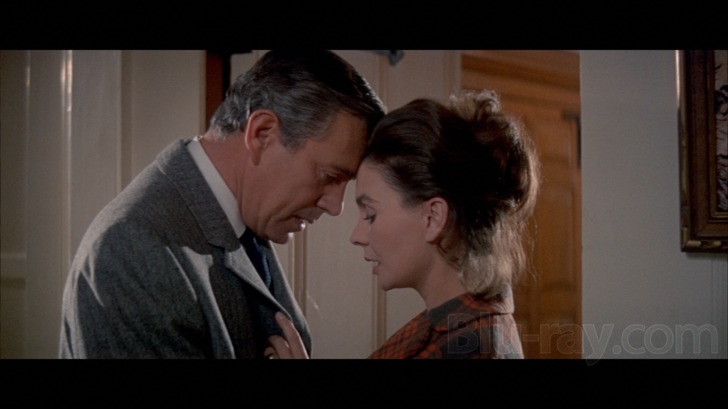
While Richard Brooks’ screenplay has few of the literary ambitions of an Edward Albee, The Happy Ending often comes off as a Who's Afraid of Virginia Woolf? wannabe in its dissection of the roiling dysfunctions that accompany the marriage between Mary (Jean Simmons, Brooks’ real life wife at the time) and Fred Wilson (John Forsythe). The film makes a tactical error right off the bat with a kinda sorta “flashback” sequence that supposedly charts the course of the couple’s courtship in the early fifties, with neither Simmons nor (especially) Forsythe looking young enough to be the college aged versions of the characters they play for the bulk of the film. A dewy montage (this film has more optical dissolves per square inch of celluloid than most) provides a cursory overview of an evidently fast trip to nuptial territory, while also briefly utilizing what initially appears is going to be a “gimmick”, Mary’s love of old movies with happy endings (see screenshot 7).
Alas, “reality” doesn’t measure up to Hollywood fantasy, and as the main late sixties time frame unfolds, Mary is a very unhappy spouse, one with a number of psychological issues and a tendency to indulge in alcohol abuse. The odd thing is that while the Wilsons do fight, on an overall scale of dysfunction, things don’t seem that bad, with Fred a rather doting and concerned husband, one who makes sure family maid Agnes (Nanette Fabray) keeps an eye on his wife when he’s away from home. Mary takes issues into her own hands and perhaps impulsively heads off on a trip to ostensible paradise, where she reacquaints herself with old friend Flo (Shirley Jones), a woman who, unlike Mary, has opted for a series of dalliances rather than the “rut” of marriage.
While there’s some piquant dialogue at play throughout The Happy Ending, the film never really coheres dramatically and instead it often feels like Brooks was simply crafting a nice little vehicle which would bring his wife an Academy Award nomination (which it did). Simmons is wonderful in a somewhat thankless role. Mary is kind of a spoiled brat when you get right down to it, and her trials often seem self inflicted, something that perhaps robs the film of a certain emotional impact. Jones is great as the “flip side” to Mary, and actually offers more visceral material at a couple of key junctures than Simmons does. Bobby Darin (billed as Robert) also has a nice bit as a heel on the make who woos Mary, at least for a little while. Other interesting if perhaps potentially questionable casting choices include Dick Shawn, Tina Louise and Teresa Wright in supporting roles.
What ultimately helps to keep The Happy Ending afloat, though, is Michel Legrand’s hugely melodic score. From the opening (kind of bizarre) mish mash of ideas that play out over a pulsating jazz bass, to the achingly beautiful sung moments that offer gems like “What Are You Doing the Rest of Your Life?”, to even throwaway moments where a background pianist is supposedly playing a little tune called “The Windmills of Your Mind”, the score is incredibly inventive and always beautifully lyrical. Something that I had never really noticed before, despite several previous viewings of/listenings to The Happy Ending, is how similar the cue under the first “courtship montage” sequence is to the theme Legrand would soon write for Joseph Losey’s The Go-Between.
The Happy Ending Blu-ray Movie, Video Quality 
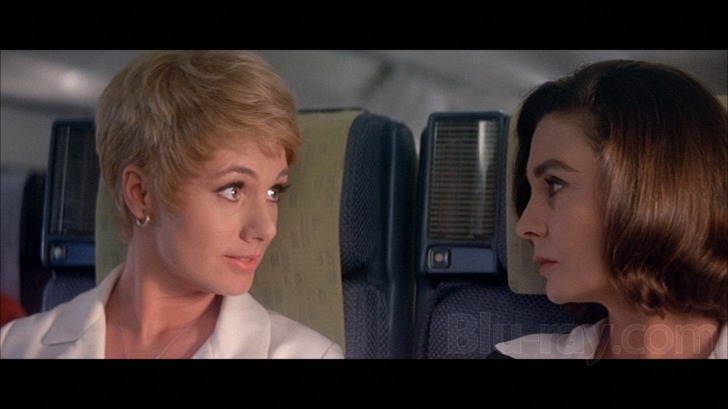
The Happy Ending is presented on Blu-ray with an AVC encoded 1080p transfer in 2.35:1. This is another MGM catalog release (by way of United Artists) that provides decent if underwhelming quality. As should be expected, things look best in brightly lit sequences, as in the long swath of the film that takes place in Nassau, but even here colors rarely really rise to spectacular heights and instead tend to tread more of a middling ambience (see screenshot 3). Elements are in very good condition, with only very minor and typical issues like tiny flecks showing up on occasion. Things look a bit rougher in some darker scenes, where the sometimes coarse grain field adds to a kind of "dupey" look at times. As mentioned above in the main body of the review, Brooks, cinematographer Conrad L. Hall, and/or editor George Grenville opt for a lot of optical dissolves throughout the film, and that tendency adds to softness, dirt and grain visibility, as should (also) be expected. The grain field does occasionally have resolution problems, assuming a somewhat mottled quality (see screenshot 10). This is another release where, like Twilight Time's recent Hawaii, I would probably weight my score somewhere between 3.0 and 3.5 if I had the ability to.
The Happy Ending Blu-ray Movie, Audio Quality 
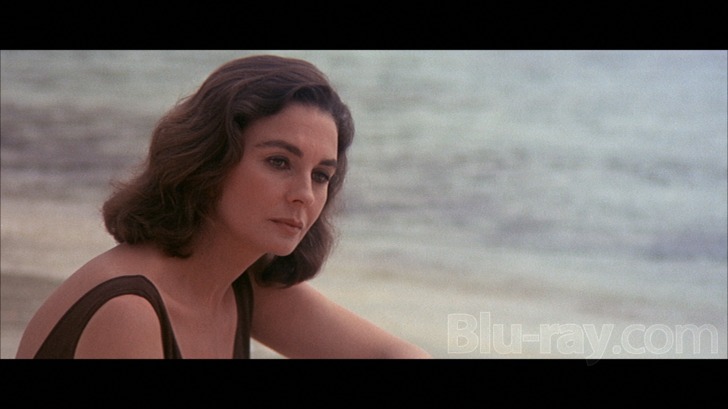
The Happy Ending's lossless DTS-HD Master Audio Mono track is occasionally a bit thin sounding with regard to Legrand's luscious music (especially when compared to the much more robust isolated score track presented in DTS-HD Master Audio 2.0), but it supports a film that is really made up almost entirely of smaller scale dialogue scenes. There is some minor dynamic range on hand here courtesy of a few emotional blow ups between various "combatants", as well as a few florid touches by Legrand in the music department. Fidelity is fine and there's no damage of any kind to report.
The Happy Ending Blu-ray Movie, Special Features and Extras 
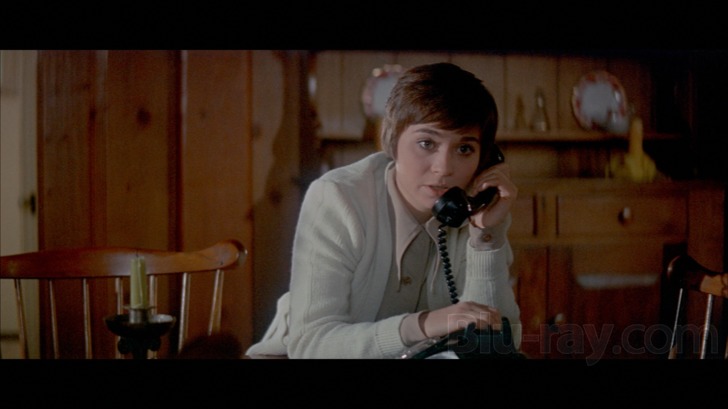
- Original Theatrical Trailer (1080p; 2:57)
- MGM 90th Anniversary Trailer (1080p; 2:06)
- Isolated Score Track is presented in DTS-HD Master Audio 2.0.
The Happy Ending Blu-ray Movie, Overall Score and Recommendation 
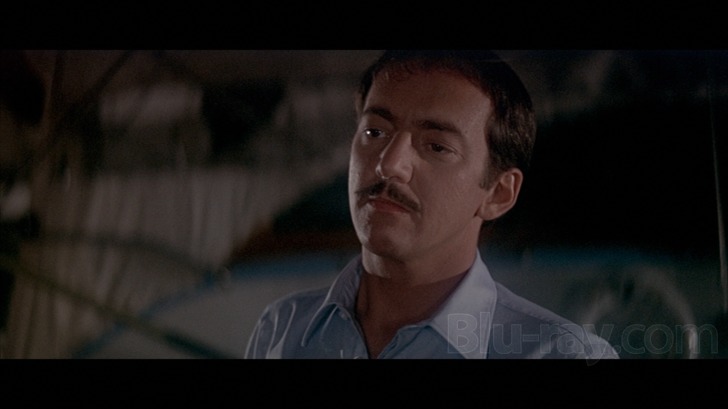
So, here's the deal—if I had been handing out the Oscars that April 7, 1970, Legrand and the Bergmans would have easily been the first "repeat" (i.e., back to back) winners of the Best Song prize since Henry Mancini and Johnny Mercer achieved that feat in 1961 for "Moon River" and in 1962 for "The Days of Wine and Roses". Bacharach and David? No "raindrops" for that team, because they would have already been awarded a prize (from me, that is) in 1967 for "The Look of Love", instead of the "real" Oscar recipient, Leslie Bricusse for "Talk to the Animals". The Bergmans have long been my favorite lyricists, to the point that if I perform any of their music with vocalists, I actually insist to the singer that not one jot or tittle of the Bergmans' beautifully crafted words be changed (as singers sometimes tend to want to do), and they provide another gorgeous "laundry list" in this lyric that perfectly suits the film's subtext, while also providing Legrand the opportunity to offer an unbelievably moving (and harmonically sophisticated) melody. Alas, I am not in charge of handing out Oscars, but at least other members of the Film Score Geek Society can now enjoy the fruits of Michel Legrand and the Bergmans' labors on this new Blu-ray. The rest of the film unfortunately doesn't consistently rise to the heights of that achievement, but it offers a good showcase for Simmons and (at times at least) the eclectic supporting cast. Video quality is a bit spotty on this one, but with caveats noted, The Happy Ending comes Recommended.
Similar titles
Similar titles you might also like

The Servant
1963

The Wife
2017

Equity
2016

Places in the Heart
Limited Edition to 3000
1984

Where the Boys Are
Warner Archive Collection
1960

Alice in Acidland
1969

Sex, Lies, and Videotape
1989

Breathe In
2013

Where the Day Takes You
1992

The Shoes of the Fisherman
1968

Miral
2010

Sleeping Beauty
Slipcover in Original Pressing
2011

Prozac Nation
2001

Christopher Strong
Warner Archive Collection
1933

A Walk on the Moon
1999

The Pace That Kills
The Cocaine Fiends
1935

Come Back, Little Sheba
1952

Nil by Mouth
1997

Not Wanted
1949

Ben Is Back
2018
